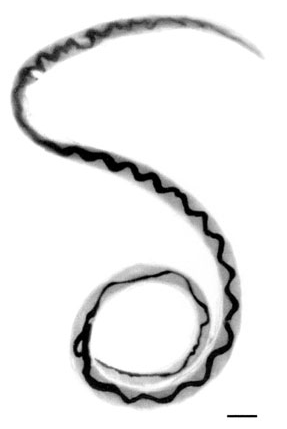Angiostrongylus
Angiostrongylus is a genus of parasitic nematodes, commonly known as rat lungworms. These parasites primarily infect rodents but can also cause significant health issues in humans and other animals. The most notable species within this genus are Angiostrongylus cantonensis and Angiostrongylus costaricensis.
Species[edit | edit source]
The genus Angiostrongylus includes several species, with the most studied being:
Life Cycle[edit | edit source]
The life cycle of Angiostrongylus species typically involves rodents as definitive hosts and various mollusks, such as snails and slugs, as intermediate hosts. The adult worms reside in the pulmonary arteries of rodents, where they reproduce and release larvae. These larvae are excreted in the rodent's feces and subsequently ingested by mollusks. Humans and other animals can become accidental hosts by consuming contaminated mollusks or other vectors.
Human Infection[edit | edit source]
Human infection with Angiostrongylus species can lead to serious health conditions. Angiostrongylus cantonensis is the primary cause of eosinophilic meningitis, while Angiostrongylus costaricensis is associated with abdominal angiostrongyliasis. Symptoms of infection can vary widely but often include severe headaches, fever, and neurological disturbances.
Diagnosis and Treatment[edit | edit source]
Diagnosis of Angiostrongylus infection typically involves clinical evaluation, imaging studies, and laboratory tests to detect the presence of larvae or antibodies. Treatment may include supportive care and antiparasitic medications, although there is no specific treatment for many cases of angiostrongyliasis.
Prevention[edit | edit source]
Preventive measures focus on avoiding the consumption of raw or undercooked mollusks and other potential vectors. Public health education and proper food handling practices are essential in reducing the risk of infection.
See Also[edit | edit source]
References[edit | edit source]
External Links[edit | edit source]
Search WikiMD
Ad.Tired of being Overweight? Try W8MD's physician weight loss program.
Semaglutide (Ozempic / Wegovy and Tirzepatide (Mounjaro / Zepbound) available.
Advertise on WikiMD
|
WikiMD's Wellness Encyclopedia |
| Let Food Be Thy Medicine Medicine Thy Food - Hippocrates |
Translate this page: - East Asian
中文,
日本,
한국어,
South Asian
हिन्दी,
தமிழ்,
తెలుగు,
Urdu,
ಕನ್ನಡ,
Southeast Asian
Indonesian,
Vietnamese,
Thai,
မြန်မာဘာသာ,
বাংলা
European
español,
Deutsch,
français,
Greek,
português do Brasil,
polski,
română,
русский,
Nederlands,
norsk,
svenska,
suomi,
Italian
Middle Eastern & African
عربى,
Turkish,
Persian,
Hebrew,
Afrikaans,
isiZulu,
Kiswahili,
Other
Bulgarian,
Hungarian,
Czech,
Swedish,
മലയാളം,
मराठी,
ਪੰਜਾਬੀ,
ગુજરાતી,
Portuguese,
Ukrainian
Medical Disclaimer: WikiMD is not a substitute for professional medical advice. The information on WikiMD is provided as an information resource only, may be incorrect, outdated or misleading, and is not to be used or relied on for any diagnostic or treatment purposes. Please consult your health care provider before making any healthcare decisions or for guidance about a specific medical condition. WikiMD expressly disclaims responsibility, and shall have no liability, for any damages, loss, injury, or liability whatsoever suffered as a result of your reliance on the information contained in this site. By visiting this site you agree to the foregoing terms and conditions, which may from time to time be changed or supplemented by WikiMD. If you do not agree to the foregoing terms and conditions, you should not enter or use this site. See full disclaimer.
Credits:Most images are courtesy of Wikimedia commons, and templates, categories Wikipedia, licensed under CC BY SA or similar.
Contributors: Prab R. Tumpati, MD

